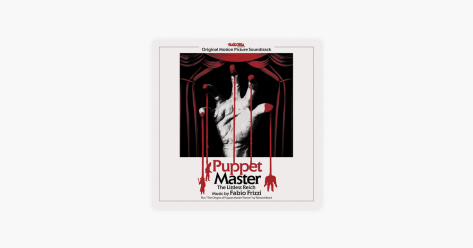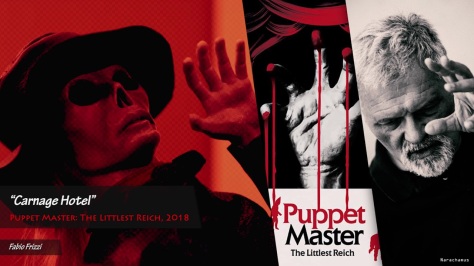Fabio Frizzi, is most definitely the most respected and revered composer of music for the Horror film genre, his atmospheric scores have chilled and terrified many audiences and also have been responsible for adding an even greater depth of foreboding and a true sense of the sinister to many motion pictures. But this talented and innovative composer does not restrict himself to writing for the Horror genre. He has in his career thus far written for adventures, westerns, romances and comedies, and on each occasion has not only fashioned music that suits and supports each storyline, and enhances each frame of film but he has been responsible for producing a highly original catalogue of music and themes, many of which are iconic and treasured compositions.

Can I begin by asking, was music for film something that always interested you, or did you move into this as your career progressed, and did you focus upon any specific instrument or area of music whilst studying?
I started playing quite early, but I had always lived in a family in love with music. And already during elementary school I sang as a soloist in a children’s choir. So I knew that music could be a good thing to do in life. In the early years, with my various bands, we played mostly music from other bands. But I also had a classic cotè, as a classical guitar player I met with various new friends with oboe, clarinet and violin. In short, if one had been able to read the future, in the crystal ball, he would have understood what my nature was, that of a somewhat eclectic and curious musician, and this was my destiny.
You are known for collaborating with famed Italian director Lucio Fulci, when you worked on his movies, such as CAT IN THE BRAIN, ZOMBI and THE BEYOND to name three, at what stage of the production did you become involved, and did he have certain ideas regarding the type of music or where music should be placed?
Yes, working with Lucio was first and foremost a pleasure. Working as a movie score composer is very complex, the final soundtrack is the result of a great collaboration and non-stop comparison with the director, the producer, the writers. The moment of entry into the game is always different, but a common element, in every situation, is reading the script, the first inspiration. Sometimes, as happened for example with The Beyond, there is the opportunity to share moments on set. And this is very useful, because you can breathe the same air as the actors, the crew, you share the scenography and the mood of the film. Other times, as happened for Zombi, I started after the shoot, and it’s a bit more difficult, but in the end, even that time, things went pretty well.

Early in your career you worked on a few westerns in Italy with, Franco Bixio and Vince Tempera, did you write as a collaborative or did you each contribute your own parts to the scores for films such as, I QUATTRO DELL’APOCALISSE and CARAMBOLA, SETTE NOTE IN NERO and what size orchestra did you utilise for these scores?

The collaboration with Bixio and Tempera was fundamental for my professional growth. We did a lot of scores together, in the 5 years of our partnership, and we had to use all our strength to cover many situations, films of different genres. Almost always we have divided the work of writing and shared that of the realization, the studio recording. And it was in that period that I refined the experience of using every form of resource, from electronics, which was becoming increasingly important and versatile in that period, to the use of good musicians, orchestral sections. Which then became a good habit.
Composers such as Christopher Young and more recently Joseph Bishara have given you credit for being a tremendous influence upon them and the way in which they compose and score movies, what composers or artistes would you say have influenced you and what is your opinion of film music today compared with movie scores from the 1960’s thru to the 1980’s?
I am honoured that composers like Christopher Young and Joseph Bishara have had such affectionate recognition for me.
It is easy to imagine that, living in contact with Italian cinema for family reasons during my adolescence, I have been influenced by many authors such as Nino Rota, Ennio Morricone, Carlo Rustichelli, who among other things I was lucky enough to meet. But the influences are many and continuous, for those who love to explore this wonderful world. I mention only one name (I should say a lot of them) among those that made me understand new possibilities and new aspects of my creative soul: the great Vangelis. Today we are in a new, varied and insidious territory. I just hope that the music will continue to emphasize cinema emotions, that music will remains the major accomplice in sipping the varied sensations that a beautiful film can give.
How many times do you like to see a movie before starting to formulate musical ideas, and how do you then bring these ideas to fruition, keyboard or more contemporary methods?
Having already read the script, as I said before, I don’t need to watch the movie too much to start with the first ideas. Watching the video repeatedly will be more useful later in the writing and detail phases. The creative process must be pure, essential, it is basically the translation of inner sensations into notes, musical phrases, harmonies. So the approach, in my opinion, must be simple, instinctive. So all I need is a recorder to fix the ideas, my instruments, piano and guitar, a notepad and a pencil. I love using sequencers, keyboards (new or vintage) and everything else, to develop ideas, but at a later stage. Our work, I believe, must remain largely a craft work.

You utilise both symphonic and electronic instrumentation within your scores, for THE PUPPETMASTER THE LITTLEST REICH, you fused these elements wonderfully as always, the opening theme being a kind of macabre waltz, which I think contained a scattering of elements of Richard Bands theme from the previous PUPPET MASTER movies, do you think at certain points a lighter approach when scoring horror movies can increase the sense of fear or terror felt by a watching audience?

The feeling of nostalgia, of a sweet melancholy is contained. I believe, from each of us. And sometimes it merges with love, or passion, or anger or fear. It is something in which I believe deeply and this an element that can be found in everything I write. The theme of the Puppet Master titles, for example, is a tribute I wanted to pay to the wonderful theme of Richard Band. In agreement with Craig Zahler, the screenwriter and my main artistic referent in this film, I decided to create this tribute. And I think this theme contains the elements I was talking about, it’s sweet, but also disturbing. And, if you get that melody out of the cinema, you take home the memory of the whole story.
















 Composer Fabio Frizzi is a master at writing atmospheric and affecting music for film, his scores have graced numerous genres of movies from the late 1960’s up until the present. His music becoming the mainstay of the Horror genre, and is responsible for adding the chills, the jolts and the jumps to many Italian horror films that have now become classics. Composers such as Christopher Young and more recently Joseph Bishara have named Frizzi as a composer that inspired and influenced them in the way they wrote music and, in the way, that they placed it within movies to create maximum effect. Frizzi worked on PUPPET MASTER THE LITTLEST REICH last year and his score is nothing short of genius, the composer fashioning a subtle and melodic work to accompany the horror that unfolds on screen. The music being at times delicate and even soothing only helps the moments of horror on screen be more well, horrible, simply because the score gives away no secrets or even hints that something untoward is going to occur. Because this is a horror movie many straight away assume that the music will be driving, chaotic and blasting in its persona, but Frizzi utilises this more relaxed and somewhat unsettling melodic style to create a foreboding and virulent atmosphere which is perfect for the movie and its many violent and unnerving scenarios. The composers at times light but apprehensive touch is probably more disconcerting than any amount of shrieking strings or blaring rasping brass. Because when the music is driven and loud one expects that violence or something scary will be occurring, but with Frizzi one just does not know. Used sparingly at times this is a score that works so well for the film, but also is a great and entertaining listen away from the picture.
Composer Fabio Frizzi is a master at writing atmospheric and affecting music for film, his scores have graced numerous genres of movies from the late 1960’s up until the present. His music becoming the mainstay of the Horror genre, and is responsible for adding the chills, the jolts and the jumps to many Italian horror films that have now become classics. Composers such as Christopher Young and more recently Joseph Bishara have named Frizzi as a composer that inspired and influenced them in the way they wrote music and, in the way, that they placed it within movies to create maximum effect. Frizzi worked on PUPPET MASTER THE LITTLEST REICH last year and his score is nothing short of genius, the composer fashioning a subtle and melodic work to accompany the horror that unfolds on screen. The music being at times delicate and even soothing only helps the moments of horror on screen be more well, horrible, simply because the score gives away no secrets or even hints that something untoward is going to occur. Because this is a horror movie many straight away assume that the music will be driving, chaotic and blasting in its persona, but Frizzi utilises this more relaxed and somewhat unsettling melodic style to create a foreboding and virulent atmosphere which is perfect for the movie and its many violent and unnerving scenarios. The composers at times light but apprehensive touch is probably more disconcerting than any amount of shrieking strings or blaring rasping brass. Because when the music is driven and loud one expects that violence or something scary will be occurring, but with Frizzi one just does not know. Used sparingly at times this is a score that works so well for the film, but also is a great and entertaining listen away from the picture.